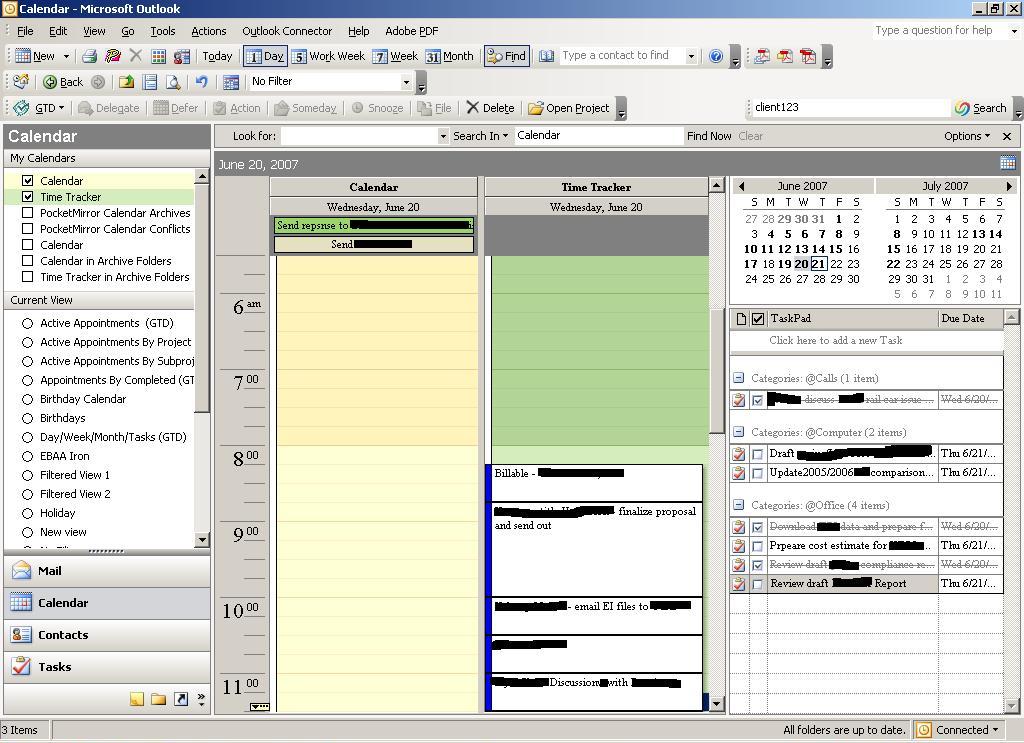ooooh, now this is a whole 'nuther ball of wax.
First, your product is your time. Period. So, on basic principle, if you are spending time on a project, someone has to pay for it. There's a few ways we can help this out a bit.
For example, when you send a letter to someone, there's a series of small things that go into it. First you type it out. Second, you print the letter and the envelope. (Personally, I find this the hardest step). Next you stuff the envelope. Then you walk over to the postage meter, apply the appropriate postage. Finally, you put it in the box for the postal carrier. Of course, clients don't really want to pay for much of that process (fair indeed). So, in my office, we have secretaries that handle all but step one.
I'm not sure that example would be helpful for you in whatever line of work you do.
The other issue that comes up, and why I think GTD is helpful, is, the client shouldn't have to pay for me looking around for something. "Gosh, I know that I put that phone number someplace...."
Your business has probably set the hourly rates they charge you at based upon several factors. One of these factors is the amount of so-called admin time that would be required by the billable person in an average task. If no admin (or low level) tasks are required, billing rates are high. If lots of low level work is required, billing rates are lower.
Another tip, record ALL your time. So, if it really takes 5 hours to get that letter done, record it. Then, before you send the bills, take a look at the time, and see if what you recorded is acceptable. If not, write it off, and tell the client you did so. Track the written-off time. At least that way, when your boss comes in and complains that you only billed 5 hours last week, you can explain yourself. It might help you to learn what you need to learn how to improve and it offers a minimal amount of protection come review time if your numbers are a tad low.
Finally, ask. Most bosses (even unapproachable ones) are willing to talk to you about billing. Ask your boss if the office normally bills for whatever task you feel the client shouldn't be charged for.
People complaining about bills are people that weren't properly prepared for the bill. You know how long stuff takes to do, so, when the call up, tell them. If you were wrong, tell them BEFORE they get the bill. People won't complain then. In my experience, complaints about bills are surprised clients. I'll also agree with AdamMiller81, crap work is still crap work, even if it's cheap.
jennytg3;49763 said:
thank you all for your input - it is much appreciated!
Thoppa, thanks for the tips about how to keep track of time using GTD, very helpful! One additional question on billing - I often struggle with whether to charge people for 'low-level' activities where I'm not using my brain. (Although I'm beginning to feel this is more of a mental construct than a fact). As a lawyer, how do you handle this issue?
Rolf, you mentioned:
"in all service businesses, just "being there" is billable."
I find this concept interesting and I'd like to hear more about what you mean. I'm starting to get the feeling I'm hugely underbilling people (i.e. no one ever complains about their bill, I underbill my monthly cap each month, people keep referring me to other people for new business, etc.)
Thanks again -
Jenny

